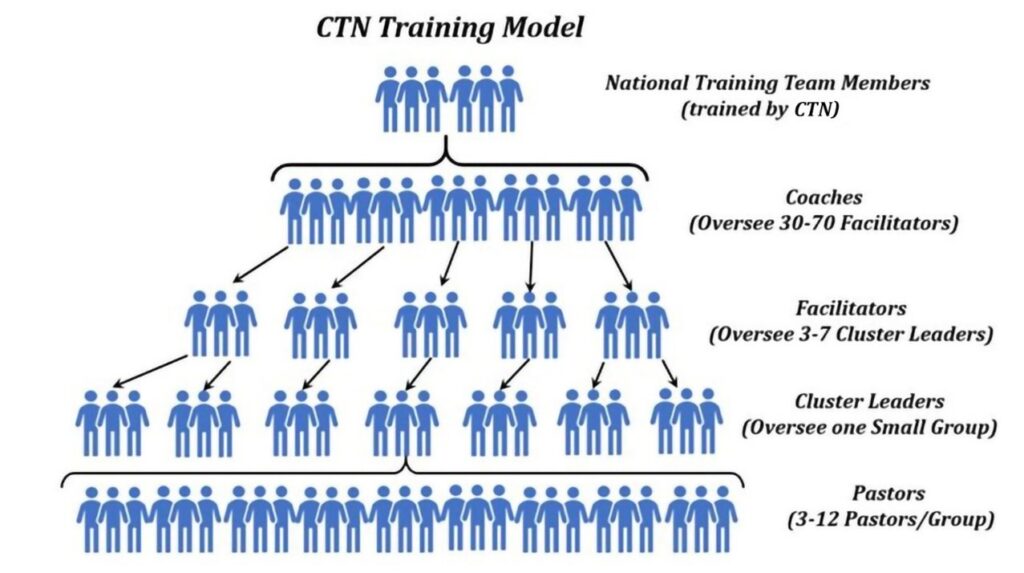CTN Methodology
Equiping Pastors to prepare believers for works of service
How we do it
CTN’s pastor training methodology begins by establishing a partnership with a denomination or national-level church, identifying and empowering a Champion, and working with them to design and implement the training program. The CTN methodology leverages a tiered organizational structure, which includes a National Training Team, Coaches, Facilitators, Cluster Leaders, and Small Group Members. The goal is to promote spiritual maturity within the Church by ensuring that pastors and spiritual leaders are relationally connected and equipped to grow in their calling, character, and ministry competency. Notably, CTN’s training structure and methodology makes training resources available to small groups at the grassroots level providing a consistent and shared training experience across a wide geographic area.

Uniqueness of CTN model
• Creates a lifelong learning community: CTN’s training methodology is designed to create a community of pastors who continue to learn and grow together. This helps them stay engaged and equipped to serve their congregations effectively.
• Access to contextualized curriculum materials: CTN provides training materials tailored to the specific needs and contexts of each denomination or national-level church. This ensures the relevancy of the training and the applicability of the lessons.
• Facilitates peer coaching and mentoring: CTN’s training model includes a tiered organizational structure that allows pastors to receive coaching and mentoring from more experienced peers. This helps them develop their skills and knowledge in a supportive and collaborative environment.
• Scalability without compromising quality: CTN’s methodology is designed to be scalable, meaning it can be adapted to work with groups of any size without compromising the quality of the training. This allows CTN to reach more pastors and leaders with their training programs.
• Cost-effectiveness: By partnering with denominations and national-level churches, CTN can deliver high-quality training programs at a lower cost than traditional training ministries.
•Sustainability: CTN’s training model is designed to be sustainable over the long term, encouraging local leaders to identify or produce content for small group study. This helps ensure that the impact of their training programs is lasting and meaningful.
Training Methodology
•Pastor training begins with establishing a partnership with a denomination or large church. The leadership then identifies and empowers a Champion, who is often the first to understand and embrace the vision of CTN. CTN works with the Champion to develop a strategic plan to implement the training model among the denomination’s pastors. This Champion leads the adoption and implementation of CTN’s training program and bears the ultimate denominational responsibility for the success of the training. The Champion is directly supported by a National Training Team, which consists of approximately five team members and serves as in-country experts on CTN’s training material and methodology.
•CTN’s training methodology relies on a tiered organizational structure as reflected in the diagram below. At each level of the training structure, leaders share in the responsibility to ensure that pastors and spiritual leaders at the local level are being relationally connected and equipped to grow in their calling, character, and ministry competency.
•The National Training Team trains Coaches, who exercise responsibility and authority over defined geographic areas. These areas often align with pre-existing denominational zones or population centers. Each Coach trains and oversees between 30 to 70 Facilitators. Their role is primarily one of leadership and administration. •
Facilitators exercise responsibility and authority over a community-based area. Typically, they provide oversight for three to seven Cluster Leaders. This role is more pastoral in nature as they coach, encourage and provide accountability for individual Cluster Leaders.
•Cluster Leaders oversee a pastoral cluster, which is made up of no more than 12 Small Group Members. A Cluster Leader’s primary responsibility is to effectively manage the group. While Cluster Leaders must have a working knowledge of the training content, they do not serve in a teaching role. Instead, CTN’s training approach requires that each pastor engage the training material personally before contextualizing and applying the content through a collective learning environment.
•Small Group Members are individual pastors or spiritual leaders who have local responsibility for a church family. Such leaders often serve as the primary communicators, leaders and counselors for the Body of Christ in that location. Small Group Members are at the core of the training model and therefore, represent the focus of CTN’s efforts. As training content is internalized and put into practice, Small Group Members grow in their calling, character and capacity to provide spiritual leadership. The church family benefits from this growth and a new capacity for spiritual maturity is established.
•This structure and methodology has the ability to project training content to the local level across a wide geographic area. Ministry reach is limited only by a lack of manpower, communication and logistical barriers.
•Each country-specific strategic plan is executed in phases, with each phase representing a new focus of study (pastoral training, preaching, etc.). The duration of each phase is dependent on the length of the training resource, typically between six and twelve months.
•Participants at each level of the training model (National Training Team, Coaches and Facilitators, Cluster Leaders and Small Group Members) have distinct responsibilities and must engage actively and consistently for the ministry to function at its full capacity. All leaders are expected to embrace Biblical standards of conduct and conflict resolution as they model the behavior of a pastor/shepherd.
